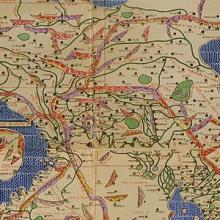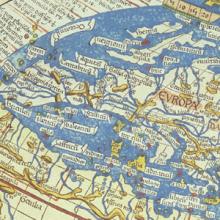Browse Primary Sources
Locate primary sources, including images, objects, media, and texts. Annotations by scholars contextualize sources.
Montesquieu, "The Spirit of the Laws"
In The Spirit of the Laws published in 1748, Montesquieu took a less playful tone. Rather than lampooning French customs as he did in The Persian Letters, he offered a wide–ranging comparative analysis of governmental institutions. He argued that the type of government varied depending on circumstances.
Voltaire, Selections from the Philosophical Dictionary
Voltaire was the pen name of François–Marie Arouet (1694–1778), an Enlightenment writer known for his plays and histories and his acerbic criticism of the French Catholic Church. This set of selections is from his Philosophical Dictionary of 1764.
Voltaire, "On the Church of England"
Voltaire was the pen name of François–Marie Arouet (1694–1778), an Enlightenment writer known for his plays and histories and his acerbic criticism of the French Catholic Church. Although Voltaire eventually became a kind of cultural icon celebrated even by kings and ministers, he often faced harassment and persecution for his views in his early days.
Montesquieu’s The Persian Letters (1721)
Charles–Louis de Sécondat, Baron de la Brède et de Montesquieu (1689–1755), was born into a family of noble judges near Bordeaux. He published The Persian Letters anonymously because he feared that his criticisms of the recently deceased Louis XIV might get him into trouble with government officials. The novel made him an overnight sensation.
Virginia’s Declaration of Rights (1776)
The Declaration of Rights drafted in 1776 by George Mason for the state constitution of Virginia influenced both Jefferson’s Declaration of Independence and the French Declaration of the Rights of Man and Citizen. It clearly states that rights are "the basis and foundation of government." The Virginia Declaration of Rights also influenced the drafting of the Bill of Rights added to the U.S.

Al-Idrisi's World Map
The Nuzhat al-mushtāq fī ikhtirāq al-āfāq, most commonly known in the West as the Tabula Rogeriana ("The Book of Roger" in Latin), is a manuscript created by the Arab geographer Muhammad al-Idrisi that contains a highly detailed, partial-world map and extensive descriptions of the seven climate zones represented on the map.
John Locke, "Of Political or Civil Society"
John Locke (1632–1704) wrote his Second Treatise of Government early in the 1680s and published it in 1690. In it Locke proposed a social contract theory of government and argued against the idea of "divine right," which held that rulers had a legitimate claim on their office because they were God’s emissaries on earth.
The Bill of Rights, 1689
In response to policies that threatened to restore Catholicism in England, Parliament deposed King James II and called William of Orange from the Dutch Republic and his wife Mary, who was James’s Protestant daughter, to replace him.

Ptolemy's World Map
Claudius Ptolemy lived in the city of Alexandria in Egypt from about 100 to 170 CE. At that time Egypt was a Roman province and Ptolemy may have been a Roman citizen. A geographer and astronomer, Ptomely's book Geographia, influenced mapmakers on questions such as the size of the earth for centuries.
The Magna Carta
King John of England granted the Magna Carta ("the great charter") on 15 June 1215. Leading nobles had demanded confirmation of their liberties and had threatened war if their demands were not met. The King agreed not to confiscate his subjects’ lands unfairly, not to raise taxes without consent, not to imprison a subject without due process and not to employ foreign mercenaries.
Universal Declaration of Human Rights
The Universal Declaration of Human Rights was passed by the General Assembly of the United Nations in 1948 to provide an authoritative list of human rights that could serve as an international standard for all peoples and nations. An affirmation of human rights seemed especially urgent once the horrors of the German genocide against the Jews and Japanese atrocities in China became well known.
Fictional Attack by "Terray" on Turgot (1781[?])
In the 1780s, following the fall of the reform–minded Turgot and Necker ministries, traditionalists felt certain that they had seen the last of the crass, pro–commerce ideas that these men and their supporters had promoted.
Linguet, "Attack on the Nobility" from Annales politiques (1789)
Simon–Henri Linguet was one of the most active and irascible old regime figures. Among his many careers, he was a lawyer (who was disbarred in 1775) and a journalist (who was forced to give up his newspaper and flee to England in 1776).
Calonne, "Programs of Reform," Address to Assembly of Notables (1787)
In 1783, Charles Alexandre de Calonne, a provincial noble, became royal finance minister. At first, he, like Vergennes, saw no need to rationalize the royal treasury or to appease the Parlements. However, by 1786 the deficit had become so huge—one–sixth of the total royal budget—that Calonne knew reforms (meaning more taxes or at least more loans) could no longer be put off.
Vergennes, "Memorandum against Necker" (1781)
In 1781, after the failure of two successive finance ministers, Turgot and then Necker, to reform the royal bureaucracy, and after the death of his politically astute first minister Maurepas, Louis XVI turned to a more conservative politician, Count Charles Gravier de Vergennes, to shore up his support at court and with the Parlements.
Necker, "Account to the King" (1781)
Unlike the British, where the crown’s finance minister gave an annual report to Parliament, the French royal treasury’s accounts were a closely guarded secret.
Turgot, "Memorandum on Local Government" (1775)
In 1774, on the accession of Louis XVI, Anne–Robert–Jacques Turgot was named Controller–General of Finances. In this position, he also became responsible for administrative policies relating to taxation, the economy, and local government.
Turgot, "Letter to the King on Finance" (1774)
In 1774, the newly ascendant Louis XVI appointed as his minister of finance a pro–Enlightenment economist and administrator named Anne–Robert–Jacques Turgot, a baron from a noble family with many generations of service to the kings of France. In office, Turgot sought to implement many reforms of the royal treasury.
Moreau, "Principles of Monarchy" (1773)
Jacob–Nicolas Moreau wrote his "lessons of morality, politics and law" for the instruction of the Dauphin. Throughout the 200–page book, Moreau defends the power of the King to rule France without opposition.
Voltaire, "Internal Government" (1756)
François–Marie Arouet, who wrote under the name Voltaire, was both the best–known and most tireless advocate of the Enlightenment and also a close associate of several European kings and many French aristocrats. In his widely read history, The Age of Louis XIV, he exalted the achievements of the Bourbon monarchy, which had brought such glory and honor to France.